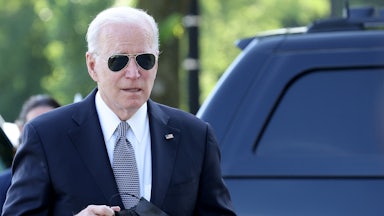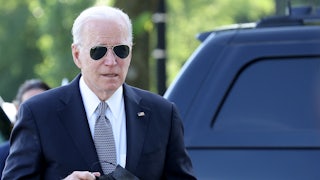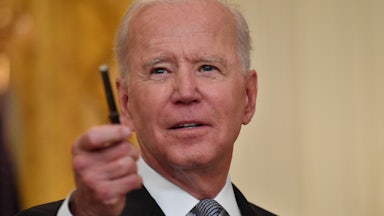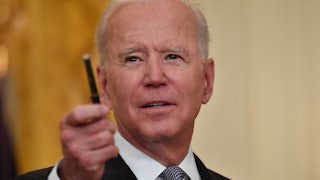As Israel prepared to remove Palestinian families to make way for settlers in East Jerusalem, and launched airstrikes on Gaza that demolished homes and killed hundreds of Palestinians, including scores of children, Democrats in Washington experienced what one pollster called a “tectonic” shift. Newly elected representatives such as Cori Bush and Marie Newman were calling attention to American complicity in Israeli practices. Even more traditionally pro-Israel senators, such as Bob Menendez and Chris Coons, offered unusual criticism, with Menendez describing being “deeply troubled by reports of Israeli military actions.” For a generation, Democrats had stood, almost unanimously and unconditionally, behind Israel; now, suddenly, even some of the most reliable supporters were wavering.
President Joe Biden, for his part, gestured to this context by stating that “Palestinians and Israelis equally deserve to live safely and securely.” But at every turn, he has remained true to his long-standing and nearly unquestioned support for Israel: He defended Israeli military actions, saying the airstrikes were not a “significant overreaction”; declined to call publicly for an immediate cease-fire; and pledged to replenish Israel’s air defense system. (In response, over 500 Biden campaign alumni published a letter calling for him to do more to protect Palestinians and hold Israel accountable.)
This is a sign of a broader trend: Even as Biden has tacked left on domestic issues, his foreign policy approach is largely trapped within an outdated consensus. Despite the global crises and endless conflicts that have engulfed American politics over the last two decades, Biden is recycling past judgments about alliances, security needs, and overall dominance, not only on Israel but also on China, Russia, Iran, North Korea, Venezuela, Cuba, and the list goes on. When Biden declares that “America is back” and “ready to lead the world,” he is signaling a shift in tone, not substance. The United States’ preexisting, Manichean vision of the globe—with its “unshakable” allies and “rogue” states—remains entrenched. The problem is that this vision exacerbates the very crises that Biden now imagines can be resolved by simply going back to the well.
Because of the sheer relief of Trump’s exit, commentators have tended to treat Biden’s foreign policy as a new beginning. In particular, two of his signature foreign policy moves have been presented as turning points. In April, when he declared that he would withdraw 2,500 troops from Afghanistan, analysts interpreted it as a historic break from American commitments. (Centrists even pushed back against withdrawal, arguing that a supposedly “precipitous” pullout could result in a second Vietnam.) In truth, the move is neither a repudiation of the logic of endless war, nor a retreat from policies predicated on American primacy. Biden is making good on a long-standing Beltway desire to pivot resources to other conflicts and rivalries, a strategy that the previous three presidents had all endorsed.
The United States stopped regarding Afghanistan as a driving strategic priority as far back as George W. Bush’s Iraq invasion, when Afghanistan became an increasingly peripheral theater of combat in a “war on terrorism” centered on the Middle East. By 2011, the Obama administration had announced a withdrawal plan, but the date shifted repeatedly, and Barack Obama left the question of a final drawdown to his successor. Trump had planned to finalize a complete withdrawal by 2021. Biden inherited this timeline, together with a consensus that the United States should pivot away from Afghanistan to focus on its rivalries with China and Russia and conflicts with other powers, like Iran and North Korea.
Biden’s other purported turning point happened even before he took office. Throughout the campaign, he trumpeted his support for multilateralism. The cornerstones of this approach include the nato alliance, partnerships with European Union nations, and key relationships in Asia and Oceania, such as those with Australia, Japan, and South Korea, as well as reentering the Paris climate agreement. Once Biden was in office, his first major foreign policy address, symbolically delivered at the State Department, declared a commitment to “diplomacy rooted in America’s most cherished democratic values.” The Beltway commentariat and former diplomats welcomed the speech as a “balm to those who despaired” in the Trump years and an “essential reset” embodying “moral clarity.”
These commitments, though, are better understood as part of the well-worn playbook of great power rivalry. Biden is shoring up traditional alliances in order to contain and even confront Russia and China. And while he has promised to “recalibrate” relations with authoritarian regimes like Saudi Arabia, he has continued the bulk of the arm sales Trump negotiated with such countries, a choice that hardly suggests a new, values-based approach. As the repeated blocking of a statement by the U.N. Security Council on Israel’s bombardment of Gaza made plain, the U.S. support for multilateralism is limited to those arenas in which the rest of the world is prepared to align with American prerogatives.
All of this points to the hollowness of claims that Biden is overseeing a new direction in foreign policy. Progressive voices have certainly pressured Biden on both the domestic and foreign policy fronts. These groups—from Black Lives Matter and Democratic Socialists of America to the Grassroots Global Justice Alliance and the Sunrise Movement—have linked their agendas at home and abroad. Racial justice activists have decried state policing power and discriminatory practices not only in U.S. cities but overseas as well, explicitly including Israel and Palestine in their critiques. Indeed, activists focused on issues such as climate change and reining in corporate power notably appreciate the global dimension of these challenges. But while the administration has earned praise on race and the economy from left figures like Representative Jamaal Bowman and Robert Reich, when it comes to foreign policy, it is a very different matter. There, Biden has held the line against activist pressure.
Simply put, the party leadership as it currently exists shows little interest in rethinking let alone fundamentally altering foreign policy assumptions. That is partly because Biden has surrounded himself with establishment figures. His secretary of state, Antony Blinken, served in the Clinton and Obama State Departments; under Bush, he was the Democratic director of the Senate Foreign Relations Committee, which oversaw the congressional endorsement of the Iraq War. Jake Sullivan, Biden’s national security adviser, worked in the Obama White House and on Hillary Clinton’s 2016 campaign. Both men played a central role in shaping a flawed, interventionist Democratic approach toward the Middle East. And while Bernie Sanders has exerted real influence on domestic issues, and Biden has welcomed Elizabeth Warren campaign staffers into his administration—including many women and people of color—this changing of the domestic guard has no parallel on the foreign policy side.
There is a deep bench of left-leaning regional and foreign relations experts. They write for Foreign Affairs or The New York Times, but remain consigned to the academy because careers in foreign policy have required operating in centrist circles. Indeed, significant lobbying for appointments of those few who have achieved some Beltway recognition and distinguished themselves from the Blob—such as Sanders adviser Matt Duss—has largely failed. All of this produces a predictable level of groupthink.
The lack of progressive foreign policy voices within the administration is indicative of a deeper problem facing the country, one that is all too visible in Biden’s stay-the-course approach to Israel. Just as past domestic assumptions centered on austerity and mass incarceration are rightly viewed today as bankrupt, foreign policy conventional wisdom should face a similar fate. Popular exhaustion with overreach helped fuel Trump’s rise to the presidency. If the Biden administration pursues tactical shifts or focuses on new priorities, such as climate change, it may alter some dynamics. Still, that alone will not disrupt an old consensus.
This raises the question of why we have seen more movement on the domestic front and what potential there might be for change in foreign policy. On domestic matters, Trump’s rise and response to racial justice movements increasingly made it impossible for even centrist Democrats to deny ongoing and structural discrimination. Democrats also came to believe that Obama’s response to the global financial crisis fell short, with the pandemic demanding a more forceful approach. In the foreign policy arena, debate over Israeli state violence could, likewise, force a reckoning about the way the United States operates in the world. Whether or not the Biden administration changes its approach, Israel’s behavior continues to attract critics—inside and outside of government—increasingly skeptical of the once sacrosanct commitment to American global primacy.
Ultimately, American interests are not well served by existing geopolitical partnerships, a sprawling archipelago of military bases, and the ongoing pursuit of armed supremacy. But to revise the core tenets of American primacy will require Democratic transformations akin to what we have begun to see on the domestic front. Unless new thinkers are brought into the party’s foreign policy establishment, Biden and his successors will inevitably peddle a twentieth-century model of U.S. leadership—one increasingly at odds with the base and ill-suited to the global challenges of the twenty-first century.








